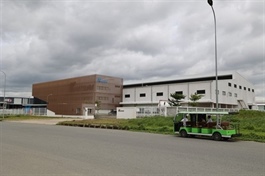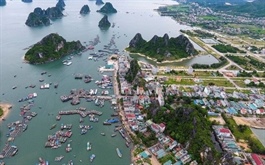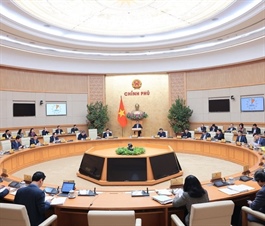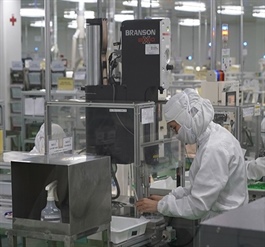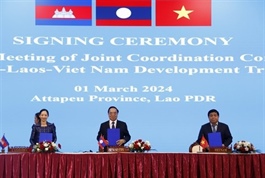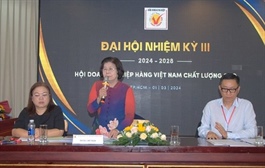SOEs urged to build value chains with private sector
SOEs urged to build value chains with private sector
State-owned enterprises need to 'dare to think, dare to do, and dare to take responsibility' to develop with new vigor and enthusiasm.
State-owned enterprises (SOEs) cannot operate independently but must collaborate with foreign corporations and private enterprises to create value chains amid ongoing global and domestic economic challenges.
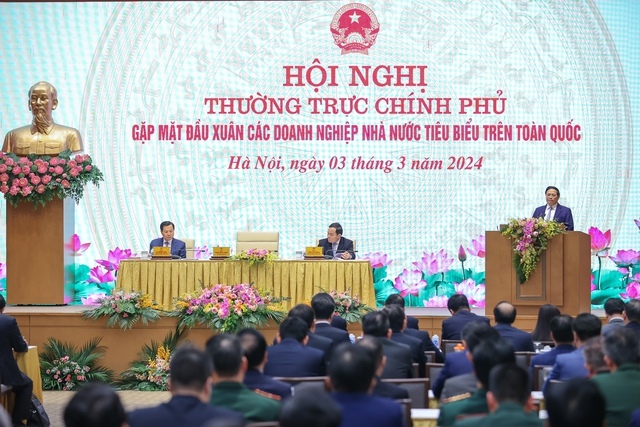
Overview of the meeting. Photos: Nhat Bac |
Prime Minister Pham Minh Chinh shared this view at a meeting with representatives of major state-run corporations on March 3, emphasizing the role of SOEs as leaders and pioneers in driving economic development.
Chinh said that in the new era of integration, these enterprises need to take the lead in innovation and embrace technological advances in emerging fields such as high technology and semiconductor chips.
"SOEs shouldn't operate in isolation but should work with foreign corporations and private entities to build value chains. This forms the basis for diversifying the region's markets, products, and supply chains," stated Chinh.
However, the Prime Minister highlighted that conglomerates and SOE corporations have not utilized their resources commensurate with their position and failed to demonstrate effective leadership. Some face difficulties in overseas investments and certain projects have incurred significant cumulative losses over the years, with restructuring efforts proving inefficient. Some entities have also encountered issues of misconduct and corruption, requiring corrective actions.
The Prime Minister attributed these challenges to a lack of proactive and timely responses to significant changes and inadequate restructuring.
"The spirit of innovation and creativity is limited in some conglomerates and state-owned corporations, as they fear making mistakes and taking responsibility," Chinh said.
To address these issues, the Prime Minister urged enterprises to innovate and restructure their management, organizational structures, and funding sources to enhance business efficiency. He emphasized the role of the government’s investment arm, the State Capital Investment Corporation (SCIC), in the efficient use of capital for development investments.
The Prime Minister cited the example of the Nghi Son Oil Refinery project, which, despite accumulating losses during its operation, was successfully restructured through proactive negotiations with Japanese and Kuwaiti partners.
"State-owned enterprises need to 'dare to think, dare to do, and dare to take responsibility' to develop with new vigor and enthusiasm," emphasized the Prime Minister.
Chinh also instructed government agencies and ministries to alleviate difficulties for enterprises in the spirit of "not waiting for them to come and request help before taking action." Additionally, he assigned the Ministry of Planning and Investment to develop a plan for managing state-owned enterprises, with a focus on separating the functions of ownership and state management.
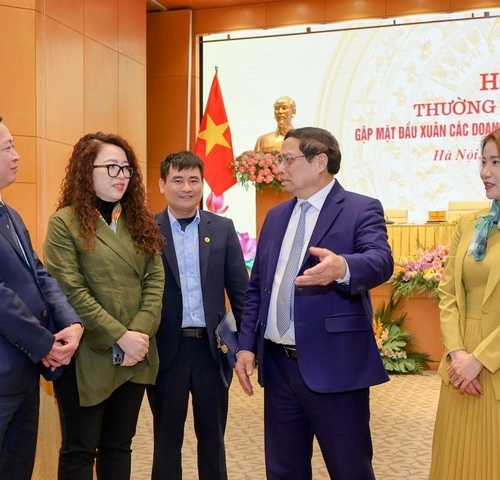
Prime Minister Pham Minh Chinh and delegates at the meeting. |
Greater autonomy expected for SOEs
From a business perspective, there is a desire for greater autonomy to enable scalable development, in line with their pivotal role in the economy. Phan Duc Tu, Chairman of the Board of Directors of the Bank for Investment and Development of Vietnam (BIDV), suggested that SOEs need sufficient scale, modern technology, and advanced management methods to be key players and foster innovation.
He suggested that the government refine regulations and enhance technological infrastructure. This would make it easier for state-owned enterprises, including commercial banks to develop modern products, services, and high-tech solutions.
On a similar note, Pham Duc An, Chairman of the Agriculture and Rural Development Bank of Vietnam (Agribank), stressed the need for greater autonomy to "dare to think and dare to act." He recommended that the government shift its management to performance-based, intensify supervision, detect violations early, and promptly address them.
"The goals set for SOEs must be specific, down to each unit, and not just growth and profit targets," he added, emphasizing the importance of a comprehensive overhaul of how officials are appointed and dismissed.
In response, Minister of Planning and Investment Nguyen Chi Dung suggested that, in addition to dismantling existing mechanisms, specific policies tailored to SOEs are needed to maintain their leading role in key industries.
He disclosed that the ministry is preparing to submit a decree to the government on the establishment, management, and use of the investment support fund from additional corporate income tax revenue, starting in early 2024. This measure is aimed at attracting strategic investors and supporting domestic enterprises to invest in emerging sectors related to green transformation (semiconductor chips, offshore wind power, hydrogen, and others).
Vietnam currently has 676 state-owned enterprises, 70% of which are wholly owned by the state, while the rest hold controlling shares.
Despite economic challenges in 2023, SOEs achieved total revenues of VND1,650 trillion ($66.8 billion), of which 80% came from 19 conglomerates and state-owned companies under the Commission for the Management of State Capital at Enterprises (over VND1,300 trillion or $52.6 billion). The state sector generated pre-tax profits of nearly VND126 trillion ($5.1 billion), surpassing planned targets by 4-8%. They also have significant resources in terms of capital and assets and employ 700,000 workers.
To date, the total assets of state-owned enterprises have amounted to VND3,820 trillion ($155 billion), with state capital investments nearing VND1,700 trillion ($69 billion).








